Google Adsense—>

2 Ways to Stop Dog Attention-Seeking Behaviors in Their Tracks.
Why Do Dogs Bark for Attention and Play?
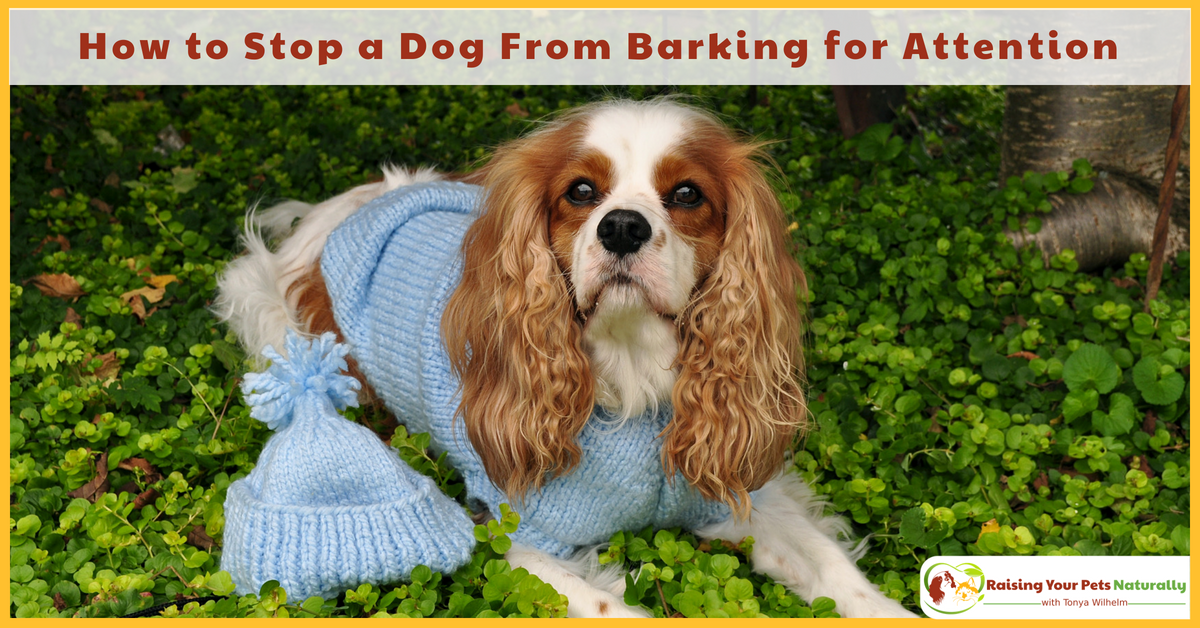
Does your dog bark for attention? Or maybe your dog throws his slobbery, wet, and dirty ball onto your lap for you to throw it. Does your dog bark to go outside and chase squirrels? These are just a few examples of a dog demanding attention.
Today I wanted to teach you how to help your dog ask for attention in a more suitable manner, or even not ask at all.
Dog Training Video Tips #1 and don’t forget to subscribe!
#2
First, I want to assure you that I want you to spend lots of fun time with your dog. I’m a big advocate for playing with your dog, walking your dog, and bonding with your dog. And a lot! However, I’m personally not a big fan of a dog who is demanding and pushy for attention. And I really don’t enjoy a dog barking at me for attention.
Why Does My Dog Bark At Me?
Dogs are fast learners and will quickly learn what works and gets them what they want. If your dog has learned that barking at you when you are preparing him dinner gets you to move faster, you better bet he’ll bark for dinner! Or, if that barking at you gets you to throw the ball, you guessed it, barking during ball play.
Attention-seeking behavior such as barking, pawing, snorting (hello, Dexter), etc. is changeable. Here are the steps to change your dog from an attention seeker to a polite member of the family.
- Do more of what your dog wants more often. If your dog has the habit of asking for play in a pushy way, instead of waiting for him to ask, play more. If you play with your dog 5 times a day, increase his play quantity by 50% (7-8). This goes for letting him outside to go potty, go for walks, whatever.
- Start your play sessions before his typical asking time. In other words, if he gets pushy for dog play around 11 a.m., start a play session at 10. This allows you to get in and reward your dog for being patient and not pushy.
- Ignore your dog for pushy behavior. I call this my “invisible dog.” Remember, your dog will continue to do what works. If being pushy gets your attention, even negative attention like saying, “no,” he will continue down that path. Yes, ignore him for barking at you. Turn around, walk away, stop all of his attention. When he’s quiet, he “appears,” and you can give him attention.
Pro Dog Training Tips: It is very likely that your dog may actually get a bit more demanding during this process. This is just temporary. Your dog is frustrated that his attention-seeking and demanding behavior is not working. He will then escalate his demands. But, stick with it. Continue to ignore your dog’s demanding behavior and most importantly, reward the quiet behavior.
And don’t forget to INCREASE his quality time, so he doesn’t feel the need to ask for attention. This is a huge component to changing this behavior.
Patience, patience, patience. If you want a patient dog, you, too, must be patient. It’s important to remember, if you are untraining a behavior, it’s going to take more time and practice than if you trained a better behavior in the first place. You are now changing the rules on your dog. If you are always frantic and want things now, your dog will likely feed off your behavior.
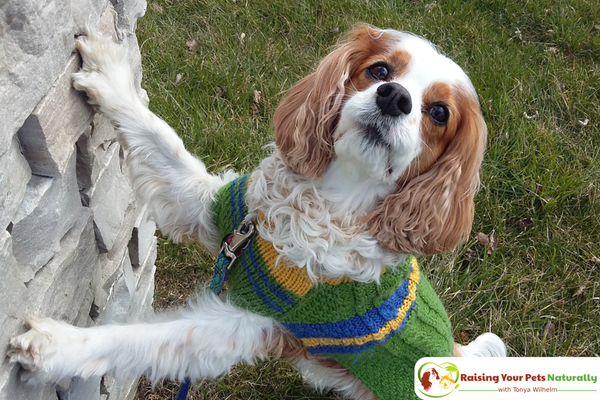
No, Dexter is not perfect, and he can be a bit demanding at times, too. The reasons are simple: I’m not perfect, and the other members of our household have rewarded him for “talking.” If I wanted to stop Dexter’s behavior, I would need to follow steps 1-2. But, as with any dog behavior, we all have choices on what’s important to us and what’s not. Our family doesn’t mind a little talking from the monkey.
As always, they are your dogs, not mine. If this is not a behavior you want to fix, then don’t. However, this also means you shouldn’t be complaining about your dog’s behavior, either, because it is totally changeable.
Your questions or comments are welcome below.
Are you looking for even more ways to stay up to date with Raising Your Pets Naturally? Sign up for the newsletter for more tips and promotions. Don’t forget to be social and Like, Follow and Subscribe.
Facebook Twitter Pinterest Instagram YouTube
 |
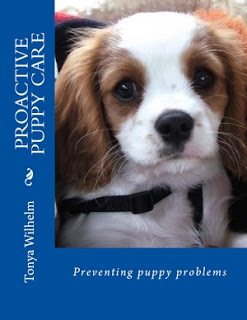 |

Google Adsense—>
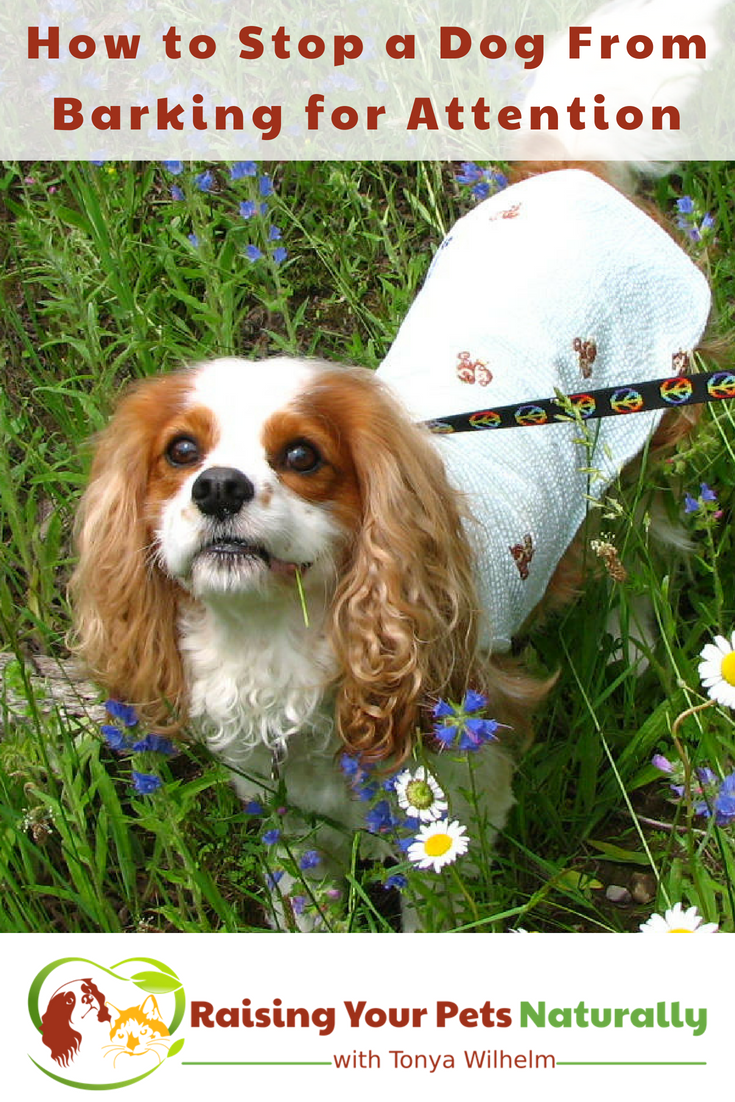




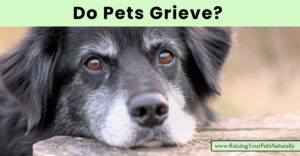
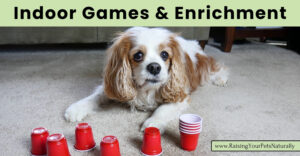
Our two Cavaliers actively watch TV. It used to be that they barked only when there was an animal on the screen, that escalated to anything animated. Now it seems that they bark at everything. They remember the commercials even without sound if there has been a dog or cat in it. Even if it’s just for a brief moment, they come running and bark incessantly. Pippa’s deaf, and has a neurological disease which often limits her physical activity. But let there be something that she’s familiar with on TV, she comes running full speed barking all the way. She follows Auggie’s lead, as she’s learned to cope even in her silent world with most of their daily activities. We started with just muting commercials, but now we completely turn the TV off. It still hasn’t helped in that we can’t even turn on the news, so we watch it using our technology in another room. It would be nice to be able to enjoy a movie or a favorite show in the evening, but that’s not to be unless they are snoozing in another room. Help!
Please feel free to contact me for a private consultation.
What do you for a dog that barks in a hotel room? Obviously, it is some anxiety but he has done this since he was small. He did it when we also had 2 dogs. We travel in an RV and can leave him there with no issues but we do sometimes stay in a hotel and would love to take him along and even go out to dinner. I do a lot trining with my dogs. I have tried Kong’s etc. Would love to understand where I went wrong. His sister never did this. He is more vocal. Also a cavalier. Thanks
Some dogs cannot be left alone in a hotel room because it’s too new and noisy. Does he have some separation anxiety?
Hey this post helped me !
I’m so glad!
My five month old puppy barks a lot when trying to get my older dog to play with her. I have tried playing with her more but she insists on jumping and barking at him until he plays with her. I have removed her from his presence but she will immediately start again when they get back together.
So, the behavior is being reinforced by your other dog playing. You can try to distract the puppy with something else to do or if the older one seems to enjoy the play, I might just let it go.